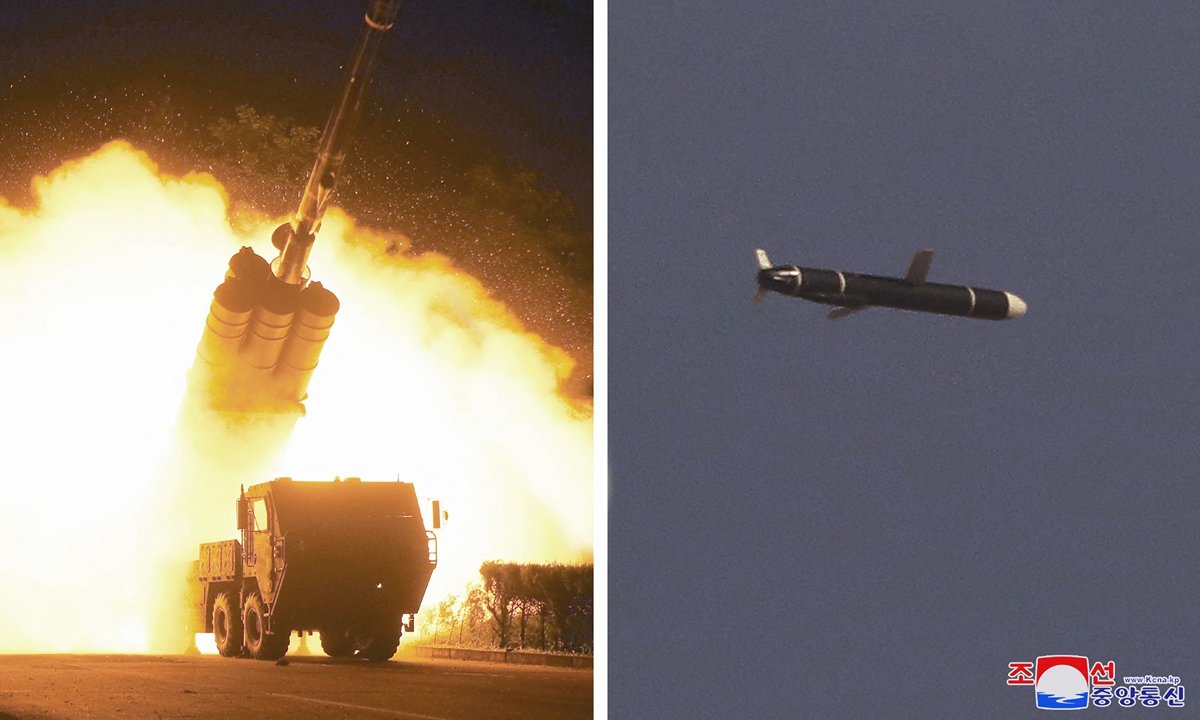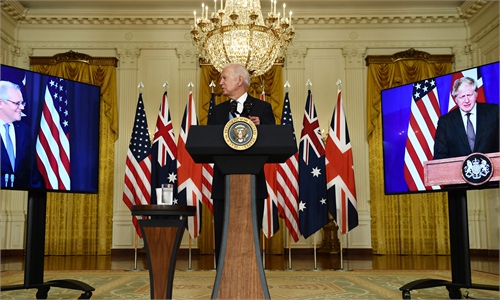
North Korea's official Korean Central News Agency (KCNA) released a photo showing the test of new type long-range cruise missiles from September 11 to 12. Photo: AFP
North Korea state media Korean Central News Agency (KCNA) on Wednesday announced that the country has tested newly developed hypersonic missile Hwasong-8 on Tuesday, a move experts said was the result of US connivance in South Korea's military growth, and will create tensions and uncertainties on the Korean Peninsula.
Pyongyang did not specify whether the missile was a ballistic missile, which would violate a UN Security Council ban.
South Korea's Joint Chiefs of Staff (JCS) on Tuesday described the missile as an "unidentified projectile," Yonhap News Agency (YNA) reported, noting no other details were immediately available. On the same day, South Korea launched a 3,000 ton-class homegrown submarine capable of firing ballistic missiles to boost underwater defense, YNA said.
Chinese Foreign Ministry spokesperson Hua Chunying said on Wednesday that China hopes relevant parties bear in mind the peace and stability of the Korean Peninsula, exercise calm and restraint and jointly promote the political settlement process of the Korean Peninsula issue.
"Under the current circumstances, the key to breaking the deadlock on Korean Peninsula and restarting dialogue is that North Korea's legitimate concerns should be taken seriously and addressed. The US should not shout empty slogans for dialogue, but demonstrate sincerity and come up with attractive dialogue proposals," Hua said.
According to Japanese media, the Japanese Defense Ministry believes North Korea's launch was "an apparent test of a ballistic weapon."
KCNA described the launch as of "great strategic significance" in boosting the independent power of defense science and technology and increasing the country's capabilities for self-defense.
The hypersonic missile marks the third missile test of North Korea in September. South Korea's JCS said North Korea fired two rounds of ballistic missiles. KCNA said North Korea has successfully tested a new type of long-range cruise missiles from September 11 to 12.
Experts said that North Korea's missile tests are being driven by US connivance with the growing military capabilities of Japan and South Korea, while uncertainty is building on the Korean Peninsula.
South Korea and Japan have begun to introduce and deploy stealth warplanes and have developed aircraft carriers beyond North Korea's ability, so North Korea feels it necessary to improve its equipment with a strong containment capability with an asymmetric approach to develop hypersonic missiles, Song Zhongping, a Chinese military expert and TV commentator, told the Global Times on Wednesday.
"The US is largely responsible for North Korea's missile tests as it has long condoned Japan and South Korea's continuous enhancement of their military capabilities and has sold a wide range of weapons and equipment to these two countries, especially the F35A and F35B warplanes," Song said.
Despite warnings from North Korea, the US and South Korea conducted joint military exercises from August 16 to 20. A South Korean submarine successfully tested a ballistic missile underwater on September 15.
North Korea's Intercontinental Ballistic Missile tests are not ruled out in the future, Song said.
Lü Chao, a research fellow at the Liaoning Academy of Social Sciences, told the Global Times that North Korea's missile tests were tentative, showing a tough stance toward the US on weapons.
He noted that North Korea has demanded that the US and South Korea stop joint military exercises and negotiate with Washington on an equal footing. "In this way, North Korea is testing the US and South Korea, waiting whether they will engage with North Korea and talk, or take tougher measures."
China hopes North and South Korea will remain rational and restrained… the best way to easing the situation on the peninsula is through peaceful negotiations, especially when North Korea is willing to make certain efforts and concessions, Lü said.


